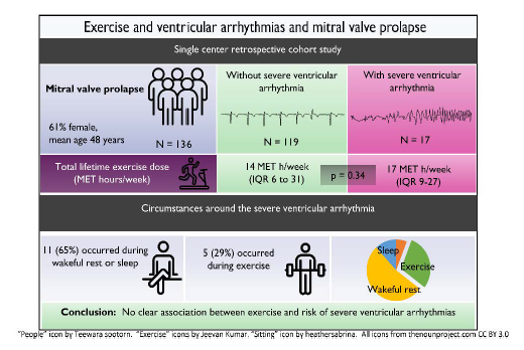Lifetime exercise dose and ventricular arrhythmias in patients with mitral valve prolapse (MVP)
Five CF, Hasselberg NE, Aaserud LT, Castrini I, Vlaisavljevic K, Lie Ø, Rootwelt-Norberg C, Aabel EW, Haugaa KH
Patients with mitral valve prolapse (MVP) have high risk of life-threatening ventricular arrhythmias (VA). Data on the impact of exercise on arrhythmic risk in these patients is lacking. We explored whether lifetime exercise dose was associated with severe VA and with established risk factors in patients with MVP. Furthermore, we explored the circumstances at the VA event.
In this retrospective cohort study, we included patients with MVP and assessed lifetime exercise dose as metabolic equivalents of task (MET) hours/week. Severe VA was defined as sustained ventricular tachycardia or fibrillation, aborted cardiac arrest, and appropriate shock by a primary preventive ICD.

We included 136 MVP patients (48 years [IQR 35-59], 61% female) and 17 (13%) had previous severe VA. The lifetime exercise dose did not differ in patients with and without severe VA (17MET hours/week [IQR 9-27] vs. 14MET hours/week [IQR 6-31], p=0.34). Lifetime exercise dose >9.6MET hours/week was a borderline significant marker for severe VA (OR 3.38, 95% CI 0.92-12.40, p=0.07), while not when adjusted for age (OR 2.63, 95% CI 0.66-10.56, p=0.17). VA events occurred most frequently during wakeful rest (53%), followed by exercise (29%) and sleep (12%).
We found no clear association between moderate lifetime exercise dose and severe VA in patients with MVP. We cannot exclude an upper threshold for safe levels of exercise. Further studies are needed to explore exercise and risk of severe VA.
This study was published in the renowned journal Europace on 18th October 2023